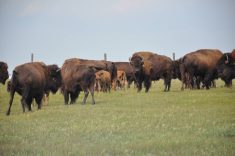Resistance concerns | USDA plans to ban off-label uses of cephalosporin in efforts to curb resistant bacteria
American moves to prohibit certain uses of cephalosporin drugs in cattle, swine, chickens and turkeys may have implications for Canadian livestock treatments.
The U.S. Food and Drug Administration issued an order Jan. 4, to take effect April 5, which will prohibit extra-label or unapproved uses of cephalosporins, a large class of antimicrobial drugs.
Veterinary drugs have approved uses listed on their labels but veterinarians can recommend alternative or off-label uses if they think the drug can be effective in treating a specific situation or ailment.
The FDA said it is taking the measure “to preserve the effectiveness of cephalosporin drugs for treating disease in humans. Prohibiting these uses is intended to reduce the risk of cephalosporin resistance in certain bacterial pathogens.”
Read Also

Trump’s tariffs take their toll on U.S. producers
U.S. farmers say Trump’s tariffs have been devastating for growers in that country.
Use of microbials in livestock production is believed to contribute to the development of antibiotic-resistant bacteria, which can be a threat to human health. However, the exact role of livestock antimicrobials in development of resistance is a matter of major debate.
Certain classes of cephalosporins are commonly used in humans to treat pneumonia, skin and soft tissue infections, as well as diabetic foot infections and urinary tract infections.
“If cephalosporins are not effective in treating these diseases, doctors may have to use drugs that are not as effective or that have greater side effects,” the FDA said.
Tim McAllister, an Agriculture Canada research scientist in ruminant nutrition and microbiology, said this particular class of antimicrobials is not used for disease prevention in Canadian cattle but is used to treat illnesses, including bacterial pneumonia in cattle and pigs.
The FDA’s move to limit certain uses of the drug might have a bearing on whether Canada considers similar changes, he said.
Alberta veterinarian Roy Lewis agreed.
“If the U.S. says they’re going to do it, it puts a lot of pressure on us to follow suit,” he said.
Specific off-label uses prohibited by the FDA in the U.S. include:
- use of cephalosporins at unapproved dose levels, durations or routes of administration
- using cephalosporins in cattle, swine, chickens or turkeys that are not approved for use in that species
- using cephalosporins for disease prevention
The FDA noted that veterinarians will be able to use or prescribe cephalosporins for limited extra-label use in the four named species as long as they follow the dose, frequency, duration and route of administration on the label.
The order does not limit the use of cepharin, an older cephalosporin drug not believed to contribute to antimicrobial resistance.















